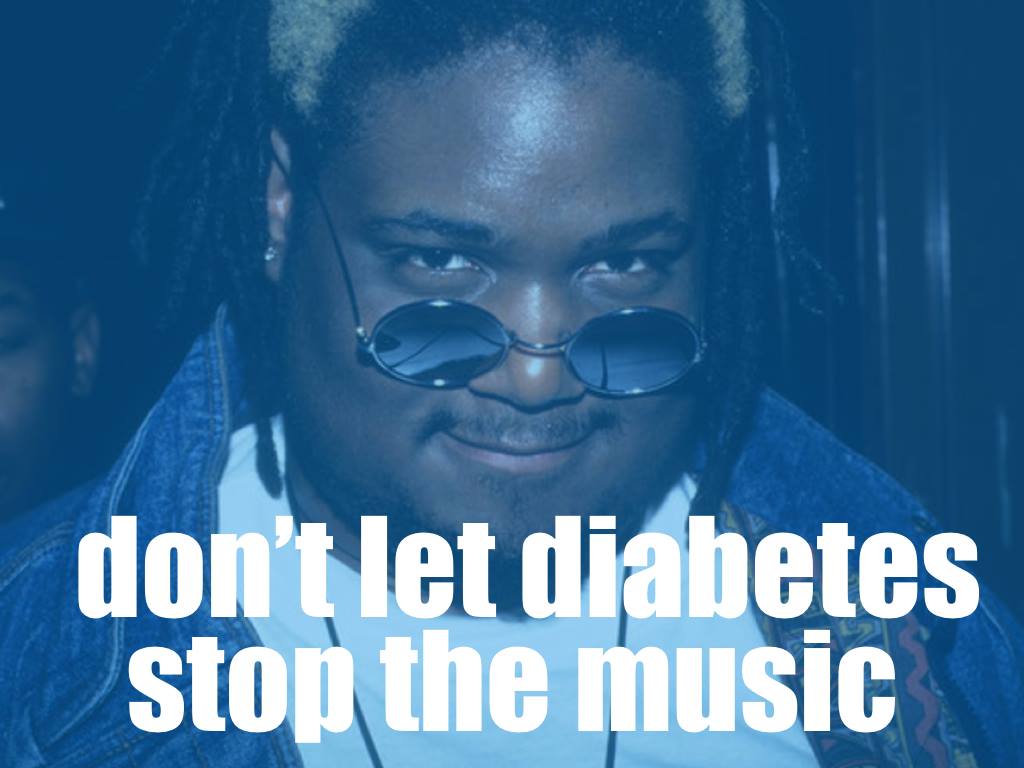
We’re still reeling from the recent sudden deaths of P.M. Dawn’s Prince Be and A Tribe Called Quest’s Phife Dawg from kidney disease related to diabetes this year. Both men died in the mid 40’s which seems way too young to me. The similarities of their life stories don’t stop there either. Both men admitted to being in denial about living with diabetes for quite a long time.
According to the American Diabetes Association ‘denial’ is so common among people living with diabetes that some doctors think it’s part of the process of accepting the diagnosis.
The trouble comes when you keep on denying your diabetes. Long-term denial stops you from learning what you need to know to keep yourself healthy and provides an opportunity for a diabetes health-related complication such as stroke, blindness, amputation or kidney disease to occur.
Poet Lorraine Brooks puts her own spin on the topic of ‘denial’ in her poem, ‘It’s Not My Denial, It’s Yours‘ from January’s Diabetes Late Nite podcast.
It’s Not My Denial, It’s Yours by Poet Lorraine Brooks
I have diabetes
and that I can’t deny.
I cannot spend time wondering
How or which or why.
Every day’s a challenge
But I meet it with a smile.
So please don’t ever, ever think
That I am “in denial“.
I think it’s more the other way.
The people,that I know.
I think denial is THEIR thing,
Because THEY do not know.
they do not know the pain we feel
With needles, and finger sticks.
They do not know how hard it is
And so they try to fix.
They tell us that if only we
Would do like Cousin Fred.
He stopped eating cabbage and
Now he is off his meds.
They tell us that we’re doing wrong
By eating birthday cake.
But they don’t see us counting all the carbs,
For heaven’s sake.
People think they know our deal
Because they know some others.
But each of us is different.
we are not like our brothers.
It’s simply not that easy
Than to just say DONT EAT THAT.
It’s simply not that easy to lose weight
And not be fat.
I wish that everybody would
Leave well enough alone.
And let us diabetic folks
Get answers on our own.
I’m not saying not to help
Or share your deep concern.
I’m saying that unless you’re here,
You’ve got a lot to learn.
So, I’m not in denial, no.
I’ve struggled and I’ve fought.
And everything I do and want to do
Requires thought.
So please just let me vent, and don’t feel like
I need advice.
I know that I must limit things like
Bread and fruit and rice.
Dont shut me down when I complain.
I sometimes scream and curse.
And don’t bellittle what I say by saying
It could be worse.
So I’m not in denial, no.
I just choose not to speak.
But you should not in any way
Consider that I’m weak.
I fight, I cry, I think, I pray.
I do it with a smile.
But please do not believe at all
That I am in denial.

LISTEN NOW: January’s Diabetes Late Nite podcast inspired by Adele. Guests include Poet Lorraine Brooks, Mama Rose Marie, the Charlie’s Angels of Outreach (Patricia Addie-Gentle RN, CDE and MaryAnn Nicolay MEd, NDTR), Jennifer Jacobs, Dana Collins Carr and Cindy Lou, who is living with type 2 diabetes from Kentucky.







 Hello Gorgeous. Goodbye, Statistics! If you are among the 13 million+ women living with diabetes, you’re not a number; you’re a Divabetic Diva!
Hello Gorgeous. Goodbye, Statistics! If you are among the 13 million+ women living with diabetes, you’re not a number; you’re a Divabetic Diva!





 Hello Handsome. Goodbye, Statistics! If you are among the 15 million+ men living with diabetes, you’re not a number; you’re a Divabetic Dude!
Hello Handsome. Goodbye, Statistics! If you are among the 15 million+ men living with diabetes, you’re not a number; you’re a Divabetic Dude!




